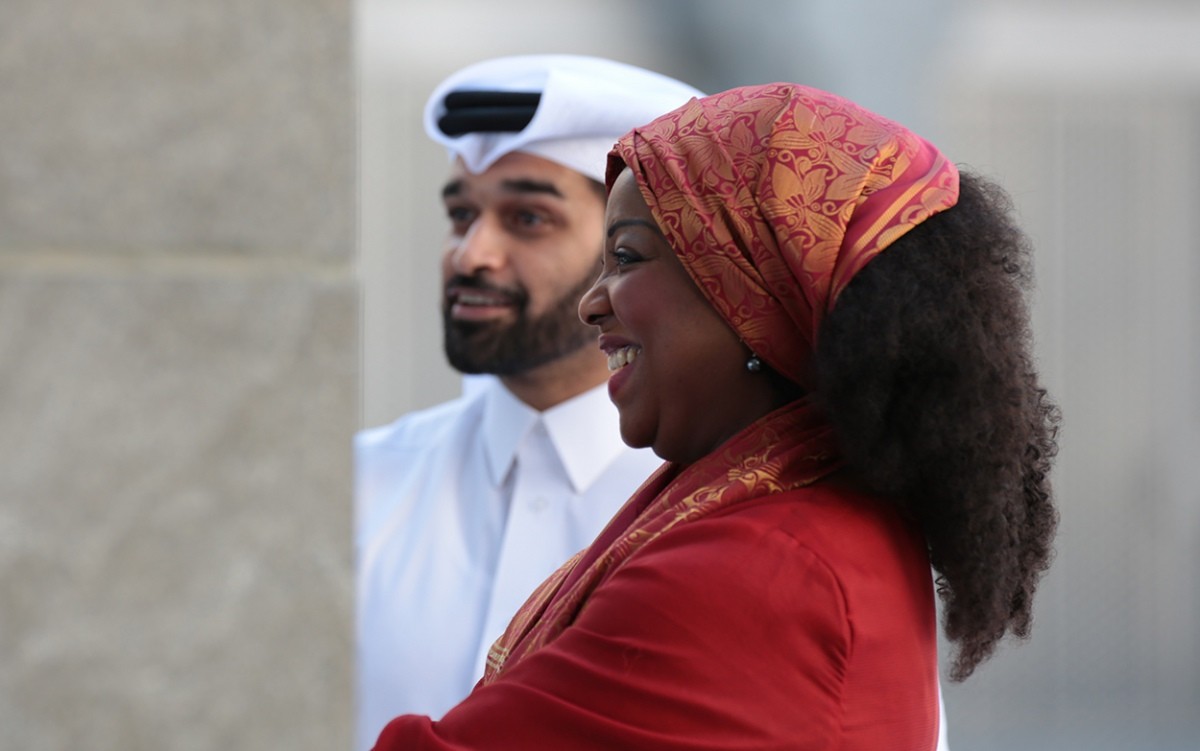.jpg)
_1-itok=GFMKQ6A9.jpg)
In an exclusive interview FIFA Secretary General Fatma Samoura has talked to www.sc.qa about Qatar´s preparations for the 2022 FIFA World Cup™, as well as speaking about the regional geopolitical situation and praising the 'spectacular' progress made on workers' welfare. The Senegalese former UN official also pointed out that Qatar 2022 can help to inspire future bidders for the world´s greatest football tournament to place a key focus on legacy planning.
Q. With kick-off for Qatar 2022 now just over five years away, how happy is FIFA with the progress on the ground?
I think that in terms of infrastructure, the projects are really unfolding as planned. One of the main stadiums at Khalifa International Stadium was inaugurated in May, and from the visits we are undertaking, and the meetings with the local organising committee, we have no reason to doubt that it will be a fantastic event. We continue to work hand in hand with the LOC to follow the progress on the geo-political situation.
We are five years from this competition, and I'm pretty sure that by the time we kick off for the opening of the World Cup in Qatar, the situation will be solved. We encourage also the mediation effort that has been undertaken by several world leaders, and if there is a way in which football can help in order to bring peace and stability in the region, we would be more than happy also to contribute to that.
Q. A further two venues for the tournament are scheduled for completion by the end of next year, with all stadiums set for completion in 2020. How important is this timely completion of venues for FIFA?
I know that for the previous World Cup, even the day before some things still had to be fixed. I think that with the experience we have seen with Russia, it adds a lot of value to have the World Cup attributed long enough in advance, to allow the host countries to finish all the work.
Q. This will be the first FIFA World Cup™ in the Middle East. What effect do you think it can have for the region?
Football is one of the biggest unifiers. With football you can really build bridges and bring communities together. Our role as FIFA is to develop football and to allow it to be played in every single part of the world, and Russia and the Middle East are no exceptions.
We have 211 member associations and six confederations, we should be fair to each of them and not portray FIFA as an organisation that focusses on only two or three continents. We should be going wherever people are and where they are interested in football.
Q. You have given a special focus to the development of women's football through your work as Secretary General. Do you see this World Cup also helping to propel this development in the Arab world?
Under the new women's football strategy, we are very ambitious. We want to double the number of youth competitions for female players, and secondly to reach sixty million female players registered. We are looking to build on the success of the women's World Cup in Canada and make sure that it is a big success in 2019 in France. We are promoting grassroots football, and bringing football to new regions where we can change perceptions. The idea with the new leadership is that women and young girls are given equal opportunity to play, without any barriers.
Q. Legacy has long been a key word for mega-events. How have you seen Qatar's approach in this regard?
Qatar's legacy approach is something which really inspired FIFA. Under the new bidding process for 2026, we are encouraging more lasting legacy programmes for all the World Cup tournaments we are organising. From what I have heard from Qatar, the way they built this legacy programme is something unique. The modular stadium concept, the fact also they will use this infrastructure for different purposes afterwards is something we really encourage. Hopefully for bidders for 2026, Qatar will be a source of inspiration and motivation on how we should use legacy programmes for future World Cups.
Q. In what other areas have you seen long-term benefits from the past seven years of Qatar's preparations for 2022?
We are working with Qatar on issues like the working conditions for migrant workers, and the progress that has been made already has been spectacular. We would like that kind of dialogue to continue between FIFA and the Supreme Committee. The World Cup has definitely helped to propel this development, and gives us the opportunity to discuss sensitive issues. We should continue to encourage football to be played in countries where there are issues, because this is the only way to also contribute to the well-being of these countries.

